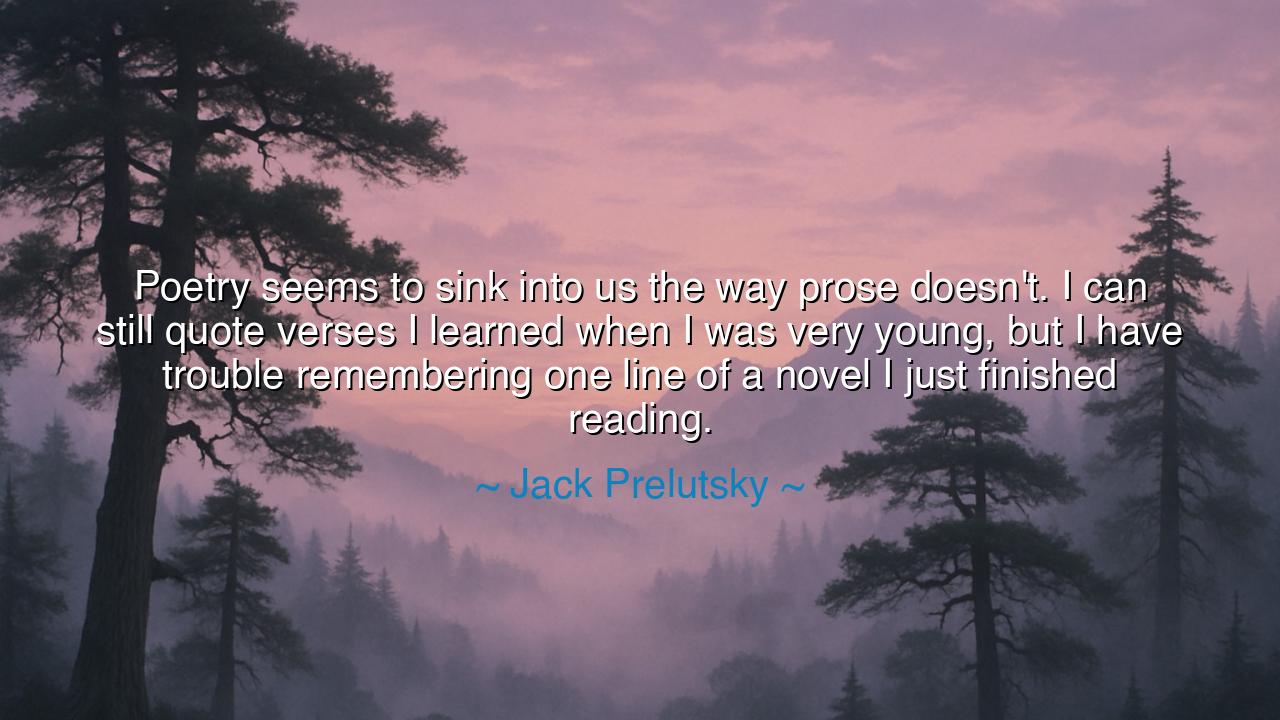
Poetry seems to sink into us the way prose doesn't. I can still
Poetry seems to sink into us the way prose doesn't. I can still quote verses I learned when I was very young, but I have trouble remembering one line of a novel I just finished reading.






“Poetry seems to sink into us the way prose doesn’t. I can still quote verses I learned when I was very young, but I have trouble remembering one line of a novel I just finished reading.” Thus speaks Jack Prelutsky, poet of childhood wonder, whose words uncover a mystery as old as language itself: that poetry, with its rhythms and patterns, lodges in the soul in a way that prose rarely can. His reflection reminds us that poetry is not merely read—it is absorbed, remembered, and carried like a song through the corridors of our lives.
The meaning of this saying lies in the unique power of poetry’s form. Prose moves in the long line of thought, unfolding steadily like a river, but poetry strikes like waves upon the heart—sharp, rhythmic, unforgettable. The rhyme, the cadence, the imagery—all act as hooks for memory. This is why a child can carry verses for decades, reciting them long after forgetting the stories they loved. Novels may enchant us in the moment, but their words disperse like mist; poetry clings like flame to the spirit.
The origin of this truth can be traced to the oral traditions of humanity. Before books, before writing, there were poems—sung, chanted, recited. They survived precisely because they were easy to remember. Rhythm and repetition made them endure across centuries, passed from mouth to mouth like sacred treasures. In cultures from the Vedas of India to the Homeric epics of Greece, poetry was not only art but memory itself, ensuring that the wisdom of ancestors would never be lost. Prelutsky, in his reflection, echoes this ancient truth: poetry enters where prose cannot, because it was born to be remembered.
Consider the story of Homer’s Odyssey, carried for centuries by bards before it was ever written. No one could have remembered thousands of lines of prose, but the rhythm of dactylic hexameter made the story live. Even today, fragments of these epics remain engraved in the minds of readers long after they close the book. Contrast this with a modern novel—captivating, perhaps, but rarely recalled line for line. Prelutsky’s testimony is not merely personal; it is the record of humanity’s long encounter with memory and art.
The lesson is that if we would remember truth, we must give it rhythm, imagery, and pattern. Whether in teaching children, guiding communities, or strengthening ourselves, poetry is the vessel by which wisdom endures. This is why sacred texts so often employ verse, and why even in political speeches, leaders turn instinctively to rhythm and repetition. The heart remembers what the mind forgets, and poetry is the language of the heart.
Practically, this means we should fill our lives with poetry early and often. Teach it to children, recite it aloud, let it shape our speech and imagination. Do not be content to consume words only in prose, which so easily fades. Choose verses to carry with you, memorize them, let them become part of your voice. In times of sorrow or joy, they will return to you, like old companions walking beside you on the road.
Thus the teaching endures: poetry sinks into us as prose does not. It is the art that lodges in memory, the song that survives when the story has faded, the flame that burns long after the firewood is gone. Prelutsky reminds us of what our ancestors knew instinctively: that poetry is not only beauty, but permanence. Let us then honor it, embrace it, and carry it within us—so that when prose has slipped away, poetry still sings in our souls.






TTDang Thi Thanh Tuyen
I’ve noticed this too—how lines from poems stay with me for years, while I often forget parts of books I’ve read recently. Could it be that poetry’s focused structure and condensed language make it easier for our brains to imprint? Maybe the emotional resonance of poetry helps anchor it in our memory more effectively. It’s fascinating how different forms of writing have varying impacts on our recall.
TGLe Truong Giang
Prelutsky’s reflection on the lasting power of poetry really stands out. Could it be that the compactness and musicality of poetry make it easier for our brains to store and retrieve? While prose gives us more to absorb and process, maybe its less structured form makes it harder to remember specific details. Is there a certain kind of emotional connection we have with poetry that prose doesn’t evoke as deeply?
MTManh Tan
I can relate to what Jack Prelutsky says about poetry sinking in. The beauty of verses and their rhythm seem to have a way of lodging themselves in our minds. But why does prose not have the same lasting effect? Is it the repetitiveness of poetry or the emotional intensity that makes it more memorable? I’d love to explore how these two forms of writing engage our memory in different ways.
BLHoang Bao Lam
This quote makes me reflect on why poetry seems to stick with us more than prose. Is it the rhythm, the rhyme, or something inherent in the structure of poetry that makes it easier to remember? Perhaps prose, being more fluid and narrative-driven, doesn’t have the same impact on our memory. It’s intriguing how poetry can create such lasting impressions, even from a young age.